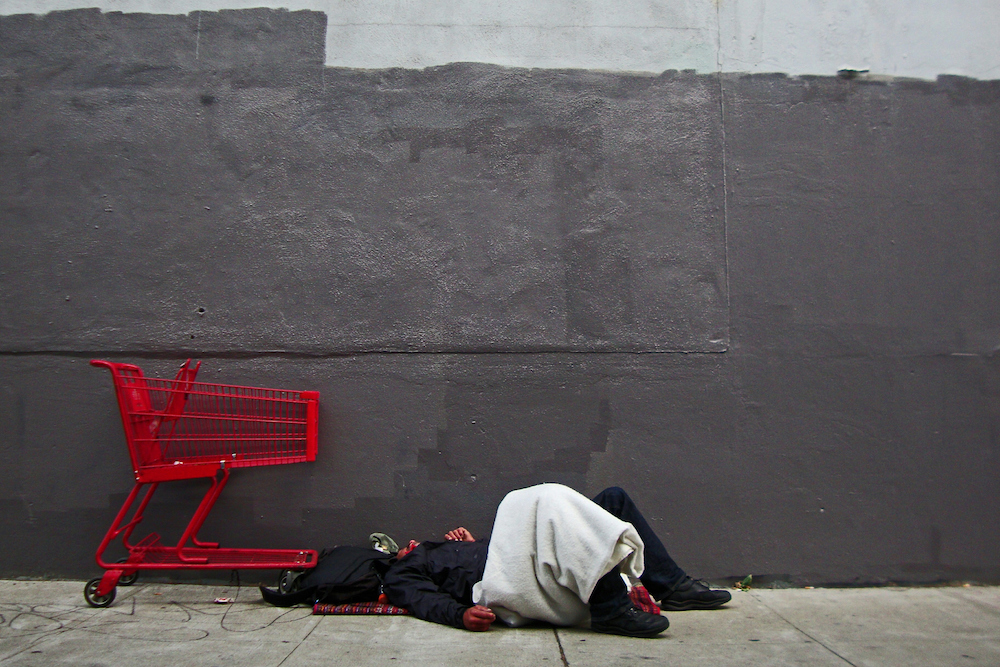On a recent freezing night in Portland, Oregon, where nearly 2,000 people sleep on the streets each evening, an unnamed infant was found dead next to his mother at a bus stop. The boy, who at that point was the fifth person to die in the city’s streets in just the first week of 2017, was born in a transient camp, and his mother was likely mentally ill. He is the face of the homeless criminalization across the United States.
America’s desire to prosecute homelessness, and even the act of begging, has led to policy measures implemented across the country that are aimed at attacking our most vulnerable citizens instead of helping them. This includes state restrictions on the use of public property, stern enforcement of permit requirements, and the outright banning of homeless encampments. People who want to aid the homeless are being targeted, too, with some local governments enacting sharp rises in fines, prosecution, and legislation targeting people serving food in public parks or giving money to panhandlers.
In 2014, The National Coalition for The Homeless—an advocacy network of activists, faith- and community-based service providers, and those “currently experiencing or who have experienced homelessness”—published a report entitled Share No More. The report covered legislative efforts aimed at criminalizing the use of public spaces and the sharing of food with those in need. According to Share No More, there are at least 31 cities across the U.S. that have restricted or eliminated food sharing all together, and with prospective cuts to social security, Medicare, and many other welfare services used by those already on the margins of society, that number is likely to rise.
Coalition For The Homeless reports that in recent years New York’s homeless population has reached “the highest levels since the Great Depression.” In 2016 alone, over 127,000 homeless men, women, and children “slept in the New York City municipal shelter system,” including over 45,000 homeless children, numbers that are up by 82 percent from the decade before it. In 2015, Department of Investigation Commissioner Mark G. Peters referred to the condition of homeless shelters in New York as “Dickensian,” in which homeless families are made to endure hazardous living spaces. This lack of safe housing options for homeless residents has led to a “revolving door of homelessness” that burdens shelters and keeps those most in need from access to safe housing options.
Housing Not Handcuffs, a report from the National Law Center on Homelessness and Poverty, takes a scathing view of anti-homeless ordinances as lamentable policy designed to excise the poor from public spaces. The report argues that anti-panhandling measures prevent those in need from being able to access money for food, transportation, medicine, or other goods, and that barring the poor from living in their vehicles “may prolong or even entrench a person’s homelessness.” Even denying the homeless a basic reprieve in the form of sitting or lying down impacts their mental and physical health, the study states. The central demand of the policy proposed by Homeless Not Handcuffs is an end to the criminalization of homelessness, and pouring energy and funding into strengthening permanent housing options.
To see how advocates battle with government instituted policy that essentially keeps the homeless homeless, SPIN spoke with 39-year-old Stephanie Roades, a homelessness advocate and phone company worker based in Milwaukee, whose decision to work in homelessness advocacy grew out of her own experience going through the welfare system.
“I feel I’ve been fighting anti-poverty measures my whole life, from the inside growing up and now thankfully the outside as an activist,” she explains. “I grew up in California and was fed with food stamps, barely survived on welfare medical, and our family lived in a public storage unit for some time when we were without a home. I know that poverty is more complex than people make it out to be, and it’s not always in our control or easily eliminated.”
Roades, who is also a lead organizer with the Milwaukee branch of Showing Up For Racial Justice (SURJ MKE), said that the Milwaukee city council recently passed a program aimed at discouraging residents from giving their money to panhandlers. The initiative led to notices being posted in areas frequented by panhandlers, and storefronts hanging up signs that bared slogans such as “Keep the Change. Don’t Support Panhandling. Help More By Giving to Charity.” In response to this campaign, Roades started a Facebook boycott page called “Keep Your Purchase Milwaukee” aimed at shaming businesses that put up these signs, which she claims was effective. (“So far, all of the window signs have been removed, and several businesses issued apologies,” Roades said.)
SURJ MKE are currently organizing two workshops on the subject of poverty criminalization, self-defense for people of color, and environmental racism. The group is also aiming to teach bystanders how to help if they witness the homeless being harassed by authorities via intervention training and filming-the-police training. Part of this training, Roades said, includes tactics like interrupting cops, or anyone, harassing the homeless or panhandlers.
“Just before Christmas we stood still in the mall holding signs about statistics in our city about poverty, homelessness, and lead contamination in our public schools and were threatened with arrests repeatedly,” she noted. “This is definitely a target of work for 2017 for us, and it’s only going to get worse.”
Though cracking down on the homeless happens on a granular, local level, away from the eyes of even the most politically attuned among us, recent developments in Washington have turned the brightest of spotlights on the general criminalization of empathy. With its ban of certain refugees, the Trump administration sought to not only institutionally erase empathy from the state, but also from its populace, too. Though it appears to have since been excised, Section 6 Trump’s infamous executive order initially called for “fines and penalties” for “those who facilitate” the “presence” of undocumented immigrants in America. His administration’s rumored desire to allow government employees to opt out of providing some services to gay, lesbian, and transgender people would have further cemented this worldview.
On the subject of homelessness specifically, Trump himself has been predictably silent, and if his administration cuts funding for programs that help low income people gain access to affordable housing then the impact will undoubtedly be devastating. It’s because of homeless advocates and organizers that this fight for accountability, and the very right to safe and affordable housing, continues. They’ve made it clear that any cutbacks made to life-saving housing and anti-poverty initiatives will be fought, because the consequences, especially for those most in need, would be dire.





